
Michael Lee Aday, known professionally as Meat Loaf, was an American singer and actor known for his powerful, wide-ranging voice and theatrical live shows. He is one of the best selling music artists in history. His Bat Out of Hell trilogy—Bat Out of Hell (1977), Bat Out of Hell II: Back into Hell (1993), and Bat Out of Hell III: The Monster Is Loose (2006)—has sold more than 100 million records worldwide. The first album stayed on the charts for over nine years, as of 2016 still sold an estimated 200,000 copies annually, and is on the list of bestselling albums.

James Richard Steinman was an American composer, lyricist and record producer. He also worked as an arranger, pianist, and singer. His work included songs in the adult contemporary, rock, dance, pop, musical theater, and film score genres. He wrote songs for Bonnie Tyler and Meat Loaf, including Bat Out of Hell, and also wrote and produced Bat Out of Hell II: Back into Hell and Tyler's Faster Than the Speed of Night.

Bat Out of Hell is the 1977 debut album by American rock singer Meat Loaf and composer Jim Steinman. The album was developed from a musical, Neverland, a futuristic rock version of Peter Pan, which Steinman wrote for a workshop in 1974. It was recorded during 1975–1976 at various studios, including Bearsville Studios in Woodstock, New York, produced by Todd Rundgren, and released in October 1977 by Cleveland International/Epic Records. Bat Out of Hell spawned two Meat Loaf sequel albums: Bat Out of Hell II: Back into Hell (1993) and Bat Out of Hell III: The Monster Is Loose (2006).

Bad for Good is the only studio album by American songwriter Jim Steinman. Steinman wrote all of the songs and performed on most, although Rory Dodd contributed lead vocals on some tracks.

Ellen Foley is an American singer and actress who has appeared on Broadway and television, where she co-starred in the hit NBC sitcom Night Court during its second season. In music, she has released five solo albums, but she is best known for her collaborations with rock singer Meat Loaf, particularly the 14× Platinum selling 1977 album Bat Out of Hell.
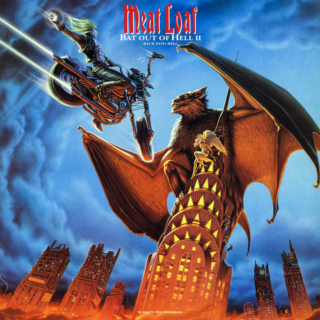
Bat Out of Hell II: Back into Hell is the sixth studio album by American rock singer Meat Loaf and the second one in the Bat Out of Hell trilogy, which was written and produced by Jim Steinman. It was released on September 14, 1993, sixteen years after Meat Loaf's first solo album Bat Out of Hell. The album reached number 1 in the United States, United Kingdom and Canada. Five tracks were released as singles, including "I'd Do Anything for Love ", which reached number 1 in 28 countries.
Rory Dodd is a Canadian rock vocalist who has performed many songs written by Jim Steinman. He is probably best known for singing as the duet voice on Bonnie Tyler's version of "Total Eclipse of the Heart", a number 1 hit on the Billboard Hot 100.

The Very Best of Meat Loaf is a 1998 album spanning the first 21 years of Meat Loaf's recording career. Although not reaching the top ten in the United Kingdom, it was certified double platinum there in 2013. The album features many of Meat Loaf's best-known songs as well as a few from his lesser known albums of the 1980s.

Bat out of Hell: Live with the Melbourne Symphony Orchestra is a live album released by singer Meat Loaf in 2004 on the Mercury and Sanctuary labels.

Karla DeVito is an American singer and actress.

Kasim Sulton is an American bass guitarist, keyboardist and vocalist. Best known for his work with Utopia, Sulton sang lead on 1980's "Set Me Free," Utopia's only top 40 hit in the United States. As a solo artist, Sulton hit the Canadian top 40 in 1982 with "Don't Break My Heart".
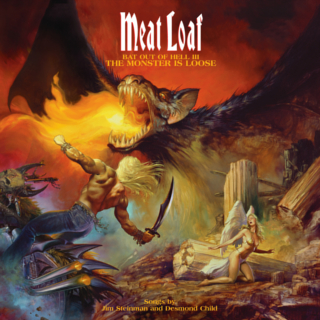
Bat Out of Hell III: The Monster Is Loose is the ninth studio album by Meat Loaf, and the third and final album in the Bat Out of Hell trilogy. It was released in Ireland on October 20, 2006, 29 years after Bat Out of Hell (1977), and 13 years after Bat Out of Hell II: Back into Hell (1993). It was released in the UK on October 23, 2006, and in the US on October 31, 2006.
"It's All Coming Back to Me Now" is a power ballad written by Jim Steinman. According to Steinman, the song was inspired by Wuthering Heights, and was an attempt to write "the most passionate, romantic song" he could ever create. The Sunday Times posits that "Steinman protects his songs as if they were his children". Meat Loaf, who had collaborated with Steinman on most of his hit songs, had wanted to record the song for years, but Steinman refused, saying he saw it as a "woman's song". Steinman won a court case, which prevented Meat Loaf from recording it. Girl group Pandora's Box went on to record it, and it was subsequently made famous through a cover by Celine Dion, which upset Meat Loaf because he was going to use it for a planned album with the working title Bat Out of Hell III.
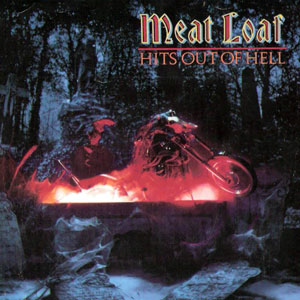
Hits Out of Hell is a 1985 compilation album by Meat Loaf. It comprises seven Jim Steinman songs. The original release also contained the hit "Modern Girl" from Bad Attitude, which came out at about the same time.
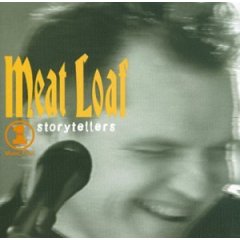
VH1: Storytellers is a live album by Meat Loaf, released in 1999. Meat Loaf told humorous stories of his career as a singer and how he unfolded into rock stardom. The DVD version has two additional songs. Some songs on the CD are taken from Meat Loaf's Hard Rock Live performance. Others were taken from the pre-show soundcheck. The album peaked at No. 129 on the Billboard 200, making it his lowest charting album in the United States.

"Bat Out of Hell" is a song written by Jim Steinman for the 1977 album Bat Out of Hell and performed by Meat Loaf. In Australia, the song was picked as the second single from the album in May 1978, accompanied by a music video. In January 1979, the song was released as a single in the UK and other European countries, and re-released in 1993.
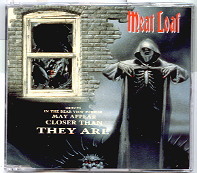
"Objects in the Rear View Mirror May Appear Closer Than They Are" is a song composed and written by Jim Steinman, and recorded by Meat Loaf. The song was released in 1994 as the third single from the album Bat Out of Hell II: Back into Hell and it reached number 38 on US's Billboard Hot 100, and number 26 in the UK Top 40. With its chart success, this song became the hit with the longest un-bracketed title at fifty-two characters as of 2007. The title is derived from the safety warning on car side mirrors in the US, "Objects in mirror are closer than they appear".
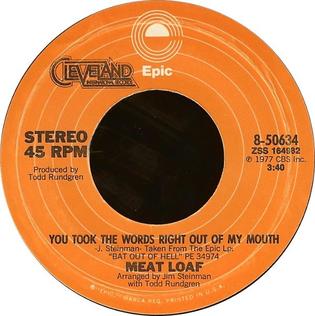
"You Took the Words Right Out of My Mouth" (also known as "You Took the Words Right Out of My Mouth (Hot Summer Night)") is the first solo single by the American singer Meat Loaf, released in 1977. It is a track from his album Bat Out of Hell, written by Jim Steinman.
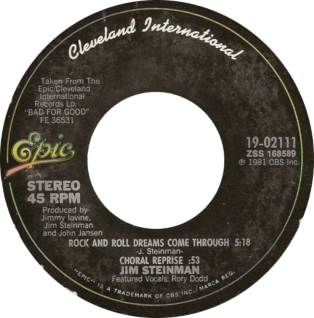
"Rock and Roll Dreams Come Through" is a song written by American composer Jim Steinman. It was first featured on Steinman's 1981 solo album Bad for Good, with lead vocals by an uncredited Rory Dodd. It was later recorded by American singer Meat Loaf and released in 1994 as the third single from the album Bat Out of Hell II: Back into Hell.

Braver Than We Are is the twelfth and final studio album by American singer Meat Loaf, released in Europe on September 9, 2016, by Caroline International S&D and released in the United States on September 16, 2016 by 429 Records.


















